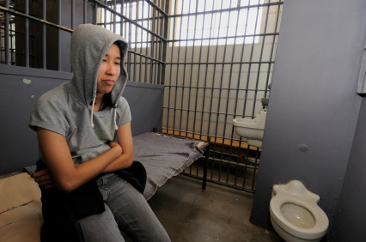|
|
| Juveniles |
| By Terry Campbell, Professor, Purdue University Global |
| Published: 07/01/2021 |
 When looking at juveniles and the criminal justice system, we find many definitions, and inconsistencies from state to state. We need to review each state's juvenile statutes for a thorough explanation. There is an ongoing debate as to what works and what does not work for recidivism and rehabilitation. Again, definitions for these two areas will vary from state to state. The juvenile system does a remarkable job of assessing and determining juvenile strengths and weaknesses. These areas include education, mental health, substance abuse, job skills, support systems, etc. Through classification, this offender's security level is determined, and housing, and programming needs are identified. However, none of the programs developed are long-term solutions.
When looking at juveniles and the criminal justice system, we find many definitions, and inconsistencies from state to state. We need to review each state's juvenile statutes for a thorough explanation. There is an ongoing debate as to what works and what does not work for recidivism and rehabilitation. Again, definitions for these two areas will vary from state to state. The juvenile system does a remarkable job of assessing and determining juvenile strengths and weaknesses. These areas include education, mental health, substance abuse, job skills, support systems, etc. Through classification, this offender's security level is determined, and housing, and programming needs are identified. However, none of the programs developed are long-term solutions.
Some questions are being asked and need answers. These are some tough questions, and I certainly understand all concerns. How well are we preparing offenders for release back into the community? Are we setting them up for failure by releasing them into the same community and environment with little support? Are the basic offender’s needs being met while incarcerated versus while residing back in the community? Have our prisons become more comfortable and contribute to the offender's return to prison? The areas I mentioned and others contribute to the change cycle. Until offenders are willing to accept the responsibilities and consequences for their actions, change will not occur. If we believe this, how do we correct this? If not, what needs to occur? Working with our youth has many challenges. Uniform and non-uniform staff need to be committed and dedicated. These youth are a complex age group, and perhaps not all staff are suited to work with these offenders and may do better working with adults. The challenges are present and we have volumes of research data as well as ongoing research. Resources are precious, and perhaps we need to do a better job of synthesizing the data. Many research areas reflect promising programs only to find later these are not working. Again, the changes begin. If we can determine the positive components, we can build upon these. At times, I had difficulty locating research materials, ongoing research, new research, webinars, and other areas. I provided a list of sources below you may or may not be familiar with. Take the time to review the various sites for juveniles and adults. Even if you are not into research, you will find the sites informative, and there are many opportunities to participate in various webinars. Not all of the sources I provide require membership. There are many sources available, and I only selected ones I use regularly. Thanks, and stay safe out there. Terry Terry Campbell is a criminal justice professor at Purdue University Global and has more than 20 years of experience in corrections and policing. He has served in various roles, including prison warden and parole administrator, for the Arkansas Department of Corrections. Terry may be reached at tcampbell@purdueglobal.edu. Other articles by Campbell |
MARKETPLACE search vendors | advanced search

IN CASE YOU MISSED IT
|


Comments:
No comments have been posted for this article.
Login to let us know what you think